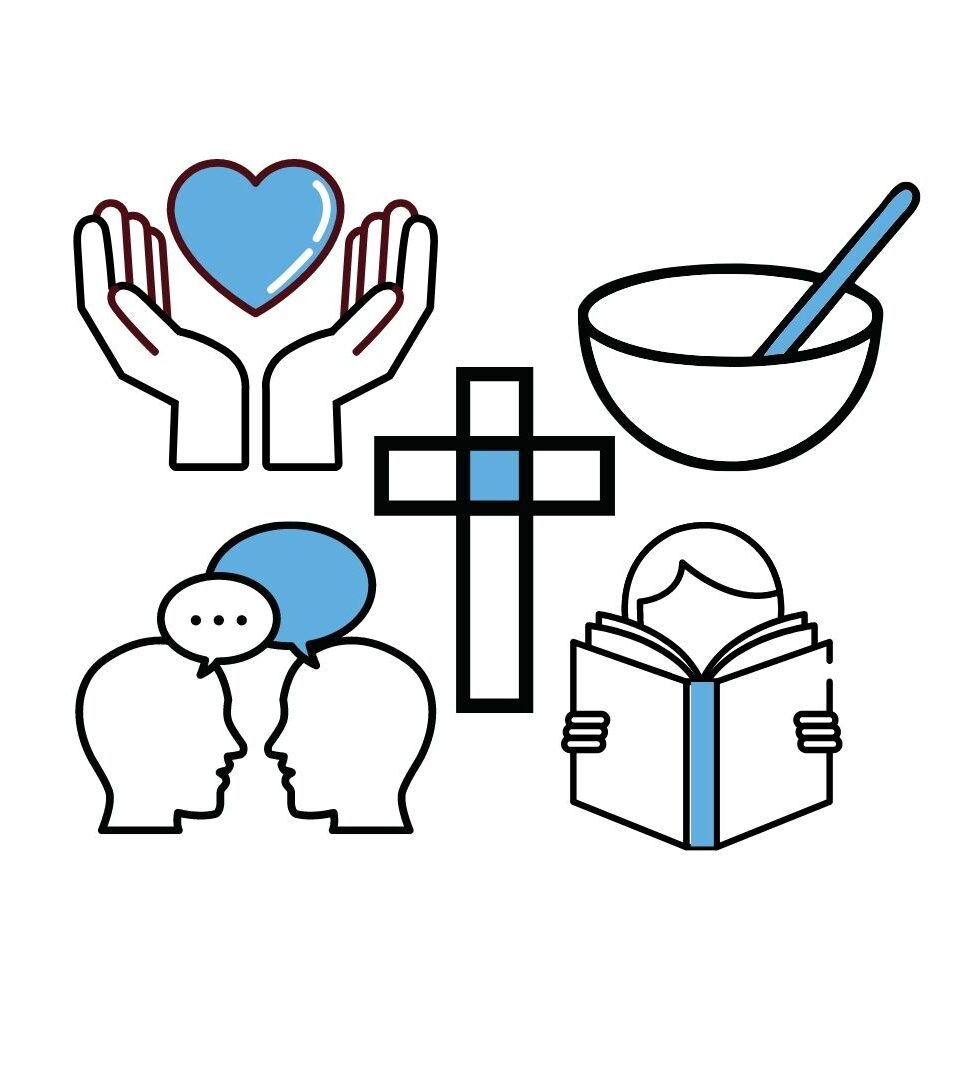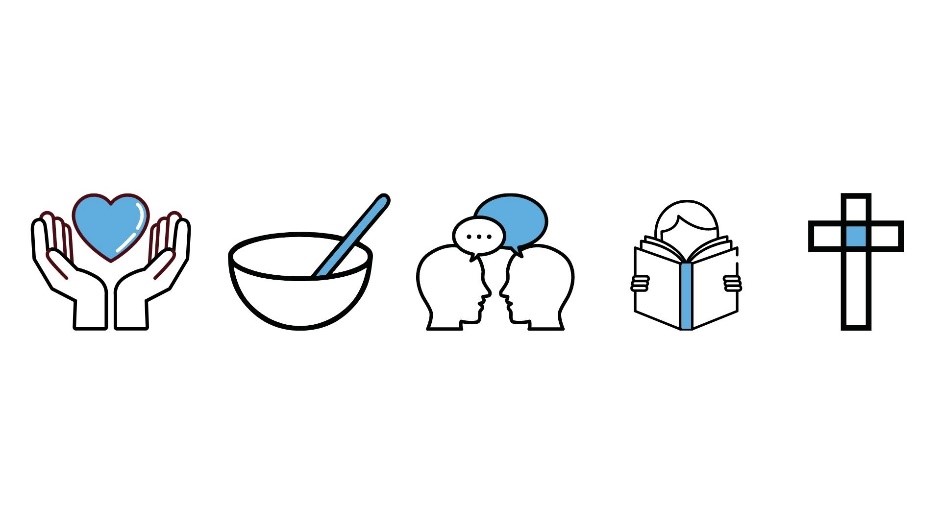
Based on an idea in Surprise the World: The Five Habits of Highly Missional People written by Michael Frost (2016) – purchase here

Introduction
During the season of Lent in 2018 and 2019, St Michael’s North Carlton set up an encouragement to develop five missional habits of spiritual life that are recommended in the abovementioned book, Surprise the World. (Listen to the B.E.L.L.S sermon here).
Using the image of ancient church bells ringing out on Sundays in times past to call the faithful to gather, Frost urges us to see that in our post-Christendom environment today we need different kinds of “bells” that send out a clear message that Jesus extends love to the world. He employs a mnemonic to help us recall five missional habits to develop as disciples who want the Good News of Jesus to be known in word and deed today.
It seems appropriate to refresh these five habits we focussed on in recent years as thoughtful and thankful responses to God’s grace to us in Christ at this time of pandemic restrictions. After all, the limitations we face due to government regulations to limit the spread of the virus should not stop Christians from sharing love and grace. Instead, we must adapt and innovate so that grace abounds whatever our circumstances, as was the practice of apostles like Paul.
Even if you are unfamiliar with the book mentioned above, the five missional habits are summarized simply below and refreshed applications are added as suggestions. We should note, before continuing, that you can find a sermon introducing these missional habits on our website. It’s vital to appreciate that the following actions and attitudes are recommended as thankful responses to God’s grace to us in Christ, not in any sense as a means of persuading God to love us more or as a means of qualifying for acceptance before God. As we know in the Gospel of Jesus, and so well summarized in Ephesians 2:8-10,
“God saved you by his grace when you believed. And you can’t take credit for this; it is a gift from God. Salvation is not a reward for the good things we have done, so none of us can boast about it. For we are God’s masterpiece. He has created us anew in Christ Jesus, so we can do the good things he planned for us long ago” (NLT).
1. Bless

Missional Habit: Bless
Missional Value: Generous (e.g. through service, encouragement, contact, etc.)
Action (suggestions) during lockdown: I will bless 3 people each week, at least one of whom is not a member of our church or my family
Meaning: In the history of the Church, to bless has often meant “to speak well of; to praise”, or “to pronounce or make happy.” It is mostly a term related to conferring happiness on another and seeking to encourage the other in word or action.
Also, part of the etymology of the term ‘to bless’ is ‘to add strength to another’s arm’. In other words, to build them up, fill them with encouragement for them to increase in strength.
A prayer of blessing:
“I pray that from God’s glorious, unlimited resources He will empower you with inner strength through His Spirit. Then Christ will make His home in your hearts as you trust in Him. Your roots will grow down into God’s love and keep you strong. And may you have the power to understand, as all God’s people should, how wide, how long, how high and how deep God’s love is. May you experience the love of Christ, though it is too great to understand fully. Then you will be made complete with all the fullness of life and power that comes from God. Now all glory to God, who is able, through His mighty power at work within us, to accomplish infinitely more than we might ask or think.” (from Ephesians 3:16-20)
Here are 3 ways we bless others today:
- Words of affirmation
- Acts of kindness
- Gifts
COVID options…
- Pray a prayer of blessing for others
- Send a card, write a letter
- Collect someone’s groceries for them and deliver them
- Make a call (e.g. phone, Zoom or FaceTime, etc) and affirm that person’s qualities
- Celebrate their special occasions
2. Eat

Missional Habit: Sharing table community
Missional Value: Hospitality
Action (suggestions) during lockdown: I will eat (virtually) with 3 people each week, at least one of whom is not a member of our church or family
Meaning: As we study the Scriptures we find that the home and table served as a centre for of encouragement and the spread of the Good News about Jesus in the early expansion of Christianity.
During the COVID-19 and the resulting lockdown and social distancing, however, this isn’t possible.
Questions we could ask ourselves include:
- How do we respond to Christ’s welcome and thus welcome others with grace and openness?
- What does eating together look like in these conditions?
- How do we deepen relationships in our current situation?
- What sort of opportunities might arise if you invite someone to share a meal with you?
A prayer of blessing:
“Give us eyes to see the deepest needs of people. Give us hearts full of love for our neighbours as well as for the strangers we meet. Help us understand what it means to love others as we love ourselves. Fill us with generosity so we feed the hungry, clothe the naked and give drink to the thirsty. Let us be a healing balm to those who are weak and lonely and weary by offering our kindness to them. Inspire us to go out of our way to include those in the margins. Help us to be welcoming and inclusive to all who are nearby. Let us be a sign of God’s hospitality in the world. Amen.
Practical tips:
- Make a mental list of people who would be encouraged by your offer of hospitality
- Pray and set out to invite your first guests soon
- Start simple, this is not a Masterchef competition, the emphasis is on sharing
- Pray that our hospitable God will give you joy in demonstrating his character to others
- No ulterior motive—the heart of hospitality sincerely communicates: “It’s my honour to be with you, let’s do this again”
COVID options…
- An “Agape meal” as a household, or together on Zoom with other households
- Have a virtual coffee or meal with someone
- Send a food hamper or croissant to mark an occasion (e.g. birthday) or to encourage
- Buy 1 meal, donate another through ASRC (meals.asrc.org.au/)
- Share the bounty from your lemon tree with neighbours
- Bake a cake and share with neighbours (what’s your specialty & do that)
- Support local businesses by buying take-away nearby
- Purchase gift cards from a supermarket to give to needy neighbours anonymously
3. Listen

Missional Habit: Listen
Missional Value: Spirit-led (i.e. open to God’s wisdom and leading)
Action (suggestions) during lockdown: I will spend at least 1 time per week of Bible reading & prayer and will “listen” to God
Meaning: From the book Satisfy your soul, Bruce Demarest writes:
“A quieted heart is our best preparation for all this work of God… Meditation refocuses us from ourselves and from the world so that we reflect on God’s Word, God’s nature, God’s abilities, and God’s works… So we prayerfully ponder, muse, and ‘chew’ the words of Scripture… the goal is simply to permit the Holy Spirit to activate the life-giving Word of God.”
Suggested Readings: Matthew 6:6; Romans 8:5; James 3:17
Silence: Use this time to ponder some words of Scripture of your own choice in silence (e.g. Psalms, Matthew 5-7, 1 John 1-2)
A song of petition may be sung at intervals:
O Lord, hear our prayer O Lord, hear our prayer When we call, answer us
O Lord, hear our prayer O Lord, hear our prayer Come and listen to us
Practical tips:
- Set a quiet environment—for you to read, listen and pray to God. In this noisy, busy life, make a quiet space and time for listening to God (e.g. Matt. 6:6).
- Know God’s Word – God’s will is already made known in the Bible, and can be “weighed” and considered in community with other Christians. We should particularly focus on the one who fulfilled all God’s promises—Jesus Christ. Learn to read, meditate on, and pray God’s Word (e.g. James 1:25).
- Listen to your heart – What is it saying? By faith we believe the Holy Spirit is living in us. Examine your heart before the Lord, and ask God for wisdom (e.g. James 1:5).
- Seek the council and prayers of others – If you hear God’s encouragement and leading, test it among other believers and seek their prayers and support (e.g. Romans 15:4-6)
COVID options…
- Set a time for Contemplative Prayer (putting the above into practice)
- On your daily exercise outing, what did you notice? People, environment. How did you feel? Write this down and reflect on your thankfulness and awareness of God’s love and grace.
4. Learn

Missional Habit: Learn
Missional Value: Christ-like (i.e. knowing for ourselves what God has done for us in Jesus Christ)
Action (suggestions) during lockdown: I will read a chapter (or more) of the Bible each day. For example, you could read the whole of Mark’s Gospel, plus the Book of Acts in the six weeks of the current lockdown.
John Stott once wrote, “The Bible isn’t about people trying to discover God, but about God reaching out to find us.” (From Basic Christianity)
COVID options…
- Listen to our recorded Sunday weekly sermons
- Join the weekly (free) Ridley certificate course via Zoom
- Join a small group meeting via Zoom that is studying the Scriptures together during the lockdown
- Find a great app for your smart device for daily devotions and set times to read, learn and pray
- Order a book to read about Jesus from an author you’ve never considered reading (e.g. from a marginalized background, middle eastern perspective, etc). It’s helpful to first read a book review of the text before ordering so as to know the author’s intent and standing
5. Sent

Missional Habit: Sent
Missional Value: Mission-minded (i.e. understanding we are living as God’s “ambassadors”)
Action (suggestions) during lockdown: I will journal regularly about the ways I alerted others to the love and grace of God through Christ (including words and actions relating to reconciliation, mercy, justice, beauty, wholeness and encouragement).
Meaning: Identifying oneself as a “sent one” because we are part of the apostolic church that Jesus commissioned to “go and make disciples…”
Readings to consider: Matthew 28:18-20; Acts 1:8; Colossians 4:5-6
- Not about going ‘to’ people or doing things ‘to’ people, it’s about going deeper ‘with’ people
- Who are you investing in? Who are you making part of your friendship group?
- We cannot do mission to people from over here with them out there. We need to be in peoples’ company and truly care for those around us. Genuinely friendship looks like this
- Who are you willing to bring into your sphere? To spend time with, get to know. To encourage, share a meal, pray for, and go deep with?
- Who do you already know and maybe getting to know during this pandemic? Neighbours? Local takeaway staff?
- What would it mean for you to ask them how they are? And to really stop and listen to their answer?
- Did any of the following topics arise in your conversations today: Relationships? Justice? Beauty? Wholeness or healing? Did anyone ask your opinion or experience? What if they did?
A prayer of blessing:
Go forth into the world in peace; be of good courage; hold fast that which is good; render to no one evil for evil; strengthen the faint-hearted; support the weak; help the afflicted; give honour to all; love and serve the Lord, rejoicing in the power of the Holy Spirit; and know the blessing of God, Father, Son, and Holy Spirit, now and always. Amen.
(Adapted from A Prayer Book for Australia, 1995, p.93)
Practical tip:
- Anne Broyles writes, in keeping a journal, “what our mind is thinking and our heart is feeling becomes tangible: ink on paper.” Consider keeping a short record of every day in a book of how God has been close to you in the day’s events. At the end of (lockdown), look back to see how journaling has shaped your thinking about being a “sent one” with other Christians in your ordinary daily living.
COVID options…
- Implement the above for the duration of the lockdown period
- Keep a journal of how you feel, what you are thinking and the ways in which you have acted on the B.E.L.L.S. habits during lockdown
- Note down conversations that went ‘deeper’ asking people how they are, & where they found beauty, reconciliation or justice today
- Where did you exercise today? Journal what you noticed and how you reflected on God’s goodness
- Consider sharing with others, or one other person (you will bless & encourage each other), what you journaled today.
Steve Webster & Kim Messieh – July 2020
St Michael’s North Carlton
